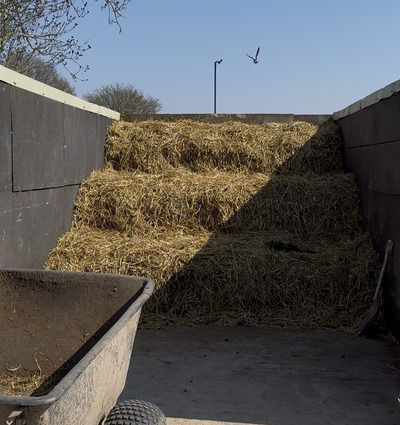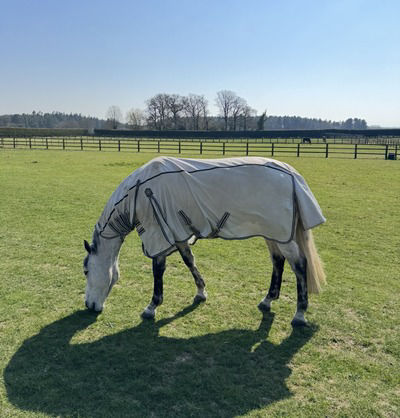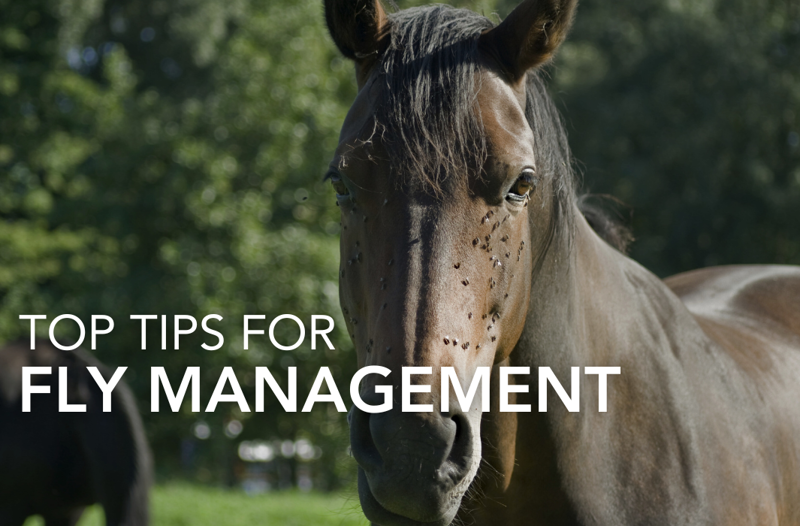Introduction:
During the spring and summer months flies can become a problem for us and our horses. For some horses fly irritation can cause sudden behavioral changes in the field, in hand and when ridden. This can include leg stomping/kicking, lack of concentration, consistent tail swatting and head shaking.
There are many products on the market designed to tackle flies with varying degrees of efficacy. In this article, our Registered Nutritionist's looks at how you can help your horse avoid flies without resorting to harsh chemicals.
1. Where there's muck... Managing Manure to Reduce Fly Irritation
You can reduce your dependence on fly sprays and insecticides by managing your horse's manure. Flies and other insects use manure as a breeding ground so keeping manure away from where your horse spends the majority of their time, will help to reduce the annoyance of flies. Composting your manure also helps, as flies are attracted to fresh manure rather than older, decomposing piles.

2. Still water: Preventing Mosquitoes by Managing Stagnant Water
Avoiding areas of stagnant water and keeping your horses away from any areas where water sits will reduce exposing your horse to mosquitos. Mosquitos are an annoyance for horses and humans and will breed in any standing water that has not been moved or added to in 5 days. Remove any buckets or troughs that could fill with water and become stagnant and ensure that you always refresh any water your horse has access to. If you have areas of turnout that are prone to waterlogging, fence these off if possible or use gravel or sand to help improve the drainage and reduce the mud.
3. Inner space: Creating a Fly-Free Stable for Your Horse
For horses that suffer badly with flies and insects or any horses with wounds that need to be kept clean, allow them access to a dark and cool space. Flies and other biting insects don’t like to enter dark barns or shelters so will naturally stay away. Avoiding turning your horse out before dawn and ensuring that they are inside before dusk will also help as these insects are more active around these times. You can also encourage as much ventilation as possible, particularly in your horse’s stable, as a strong breeze will make it harder for insects to hover.
4. Barrier methods: Using Fly Masks and Rugs to Protect Your Horse
Fly masks and fly rugs help to provide a physical barrier which is an effective way of preventing flies and insects from physically touching your horse’s skin. Fly masks help to prevent flies from entering the horse's ears and stops them landing around their eyes, which for some horses can cause irritation and eye problems.

5. The Natural World: Attracting Insect-Eating Wildlife to Your Yard
Other methods to manage fly and insect populations include encouraging insect eating birds and bats. Swallows are great fly catchers and can consume thousands of insects in one day. Bats eat nocturnal flying insects so with a diverse range of wildlife around your yard, you can have 24-7 management of flies and other insects to help keep you and your horse comfortable.
6. The Herbal Solution: Utilising Nutrition to Repel Flies from Horses
Before reaching for chemical control methods, there are lots of herbs and natural ingredients which can help your horse out and also deter flies and insects. Garlic contains a sulphur compound, which when ingested, is secreted through the skin. Insects taste via their feet, and those landing on the horse dislike this sulphur, and so are less likely to bite the horse. Fenugreek offers similar benefits making it a beneficial fly deterrent. Lemon Peel contains limonene, which is a potent insect repellent. Peppermint contains menthol which acts as a natural pesticide and Rosemary, which is naturally strong smelling and so helps keep flies at bay.
Conclusion
From managing your muck heap and avoiding stagnant water to providing dark, cool shelters and using herbal deterrents, there are a variety of ways to naturally reduce flies around your horse. Additionally, physical barriers like fly masks and rugs, as well as welcoming natural predators like swallows and bats, can further support a fly-free environment. By incorporating these strategies, you can help your horse stay comfortable and healthy throughout the spring and summer months.
For any advice or questions you may have, please don't hesitate to reach out to our expert nutrition team. You can call 0800 585525 Monday-Friday 8:30am-5:00pm, email [email protected], use the Live Chat function on our website, or send us a DM on social media.



